Music Reviews, 12/2010
by James Brubaker and Joshua Cross
James Brubaker
How To Dress Well
Love Remains
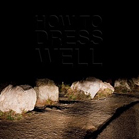 To Describe Tom Krell’s How to Dress Well as haunting is an understatement—in fact, anything short of utterly haunted fails to convey the desperation and fragile pathos permeating every shadow saturated corner and flickering-bulb-lit-hallway on the band’s debut LP, Love Remains. The fourteen songs that make up the album—mostly culled from six EP’s Krell posted on his blog over the last year—range from ethereal ambience to art-damaged, the end result being drum-machine driven, faux r ‘n’ b slow jams that sound vaguely like an unsettling amalgam of Burial, Bon Iver and Maxwell. “Escape Before the Rain,” is austere and low key. The song’s lack of percussion allows it to succumb to its own atmosphere allowing it to become one of the album’s most quietly desperate moments. In contrast, the jittery drum machines, not-quite-in-time falsetto vocals, and auto-tune echoes of “Ready for the World,” and “My Body,” blur the lines between pop music and an almost stifling post-apocalyptic sense of isolation.
To Describe Tom Krell’s How to Dress Well as haunting is an understatement—in fact, anything short of utterly haunted fails to convey the desperation and fragile pathos permeating every shadow saturated corner and flickering-bulb-lit-hallway on the band’s debut LP, Love Remains. The fourteen songs that make up the album—mostly culled from six EP’s Krell posted on his blog over the last year—range from ethereal ambience to art-damaged, the end result being drum-machine driven, faux r ‘n’ b slow jams that sound vaguely like an unsettling amalgam of Burial, Bon Iver and Maxwell. “Escape Before the Rain,” is austere and low key. The song’s lack of percussion allows it to succumb to its own atmosphere allowing it to become one of the album’s most quietly desperate moments. In contrast, the jittery drum machines, not-quite-in-time falsetto vocals, and auto-tune echoes of “Ready for the World,” and “My Body,” blur the lines between pop music and an almost stifling post-apocalyptic sense of isolation.
With so many bizarre ideas running through the album, How To Dress Well relies on extremely lo-fi production to provide the songs with a unified context. By the time we get to the album’s penultimate track—and one of the best songs of the year—the triumphant anthem “Decisions (feat. Yuksel Arslan),” we are so immersed in Krell’s meticulously (un)sculpted sonic world that, when the album ends with “Suicide Dream 1,” the silence at the end of the disc is shocking. While the production and singular vision that Krell has poured into How to Dress Well’s debut full length might prove inaccessible or challenging, the album is worth the effort. Love Remains isn’t only one of the best debuts of 2010, it’s one of the year’s best records, period.
Robyn
Bodytalk pt. 2
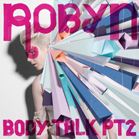 Robyn is on a roll. After several years of little activity following the release of her 2005 international re-branding album Robyn, the Sweedish pop-star owns 2010. To that end, Bodytalk pt. 2—the middle chapter in a planned series of three “mini-albums” to be released over the course of a year—is a bold and exciting set of songs. While it doesn’t quite match the stunning consistency of its predecessor, Pt. 2 can hardly be considered a misstep. Robyn achieves a characteristic pop bliss on tracks like “In My Eyes,” and “Hang With Me,” which blend fizzy synth-lines with endearing pop vocals and immensely satisfying hooks. Even the odd, dance-floor banger, and late-night-poetry rave up “We Dance to the Beat,” finds Robyn imparting a rare warmth among the big drums and electronic melodies.
Robyn is on a roll. After several years of little activity following the release of her 2005 international re-branding album Robyn, the Sweedish pop-star owns 2010. To that end, Bodytalk pt. 2—the middle chapter in a planned series of three “mini-albums” to be released over the course of a year—is a bold and exciting set of songs. While it doesn’t quite match the stunning consistency of its predecessor, Pt. 2 can hardly be considered a misstep. Robyn achieves a characteristic pop bliss on tracks like “In My Eyes,” and “Hang With Me,” which blend fizzy synth-lines with endearing pop vocals and immensely satisfying hooks. Even the odd, dance-floor banger, and late-night-poetry rave up “We Dance to the Beat,” finds Robyn imparting a rare warmth among the big drums and electronic melodies.
As with Robyn’s previous work, the driving force behind the success of her idiosyncratic pop is her persona—she walks a fine line between tough and dirty, and human and vulnerable. She showcases the first on the electro-clash inspired “U Should Know Better” (which features a surprisingly effective guest spot from Snoop Dogg, and bold lyrics like “Even the Vatican knows not to fuck with me”) and the second on “Hang With Me,” and the gorgeous, orchestral ballad “Indestructible” that closes the album. With a little luck, maybe by the end of the year Robyn will have the kind of enormous international audience that she deserves. If this Bodytalk series doesn’t do the trick, I don’t know what will.
No Age
Everything in Between
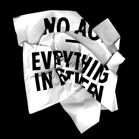 The cover of No Age’s second proper LP—2007’s gloriously messy Weirdo Rippers was compiled from previous EP’s—is a fitting metaphor for the band’s new sound. This isn’t meant to imply that Everything in Between is a wadded up piece of garbage, but that No Age’s sound has been tightened, refined and re-thought. However, just as we can see enough of the words on the crumpled sheet of paper to know that it says No Age, we can still hear that the band’s signature sound—abrasive feedback and impenetrable walls of guitar crashing together to make sun-drenched anthems—is still at the core of these compositions. “Glitter” is the album’s first big surprise, finding No Age stomping through a fairly normal sounding indie-punk “love” song in which Dean Spunt pines for someone to be “back underneath [his] skin.” Were it not for the squalls of feedback in the background and Spunt’s slightly off-key vocals, the song would probably already be in a dozen car commercials. And that’s okay. It’s a good song that serves as a perfect example of how sharp No Age’s writing has become while demonstrating that they’re still not afraid to fuck with a formula by piling on the feedback.
The cover of No Age’s second proper LP—2007’s gloriously messy Weirdo Rippers was compiled from previous EP’s—is a fitting metaphor for the band’s new sound. This isn’t meant to imply that Everything in Between is a wadded up piece of garbage, but that No Age’s sound has been tightened, refined and re-thought. However, just as we can see enough of the words on the crumpled sheet of paper to know that it says No Age, we can still hear that the band’s signature sound—abrasive feedback and impenetrable walls of guitar crashing together to make sun-drenched anthems—is still at the core of these compositions. “Glitter” is the album’s first big surprise, finding No Age stomping through a fairly normal sounding indie-punk “love” song in which Dean Spunt pines for someone to be “back underneath [his] skin.” Were it not for the squalls of feedback in the background and Spunt’s slightly off-key vocals, the song would probably already be in a dozen car commercials. And that’s okay. It’s a good song that serves as a perfect example of how sharp No Age’s writing has become while demonstrating that they’re still not afraid to fuck with a formula by piling on the feedback.
What satisfies most about Everything in Between is the evolution of No Age’s attitude. On Nouns, the band seemed both terrified and ecstatic—alienated from whatever it was they thought life was, but determined to own that youthful alienation and wrench every ounce of passion from their circumstances. On this new album, outside of album opener “Life Prowler” (with its chorus of “I like my life”) No Age seem bored, disappointed, disaffected. On “Common Heat,” Spunt sings, “I try to make myself seem vague,” a sentiment that pervades this set of songs and brings us back to the album’s cover. The striking image doesn’t simply point to the band’s sonic evolution, it points to a sense of feeling discarded and forgotten. Everything in Between might not be as immediately and gloriously noisy as No Age’s previous output, but the juxtaposition of its downtrodden themes and sharper production result in an engaging and tight work of art.
Deerhunter
Halcyon Digest
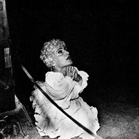 Deerhunter’s fourth LP, Halcyon Digest, isn’t an easy first listen, especially for fans of the bands previous albums. Over the course of those three albums, fans grew accustomed to shoegazey bursts of drone and indie-minded guitar pop with hints of punk interspersed like caustic exclamation points. The formula, if we can call it that—the band has always shifted and stream-lined its sound from album to album—worked to the extent that, after three albums, Deerhunter had compiled one of the stronger discographies in indie rock which, until now, climaxed with 2008’s minor-masterpiece Microcastle. This brings us to Halcyon Digest, an album that finds Deerhunter scaling back the guitar fuzz and downplaying the psychedelic rave-ups that defined some of their finest moments in exchange for crystalline production, simple, melancholy compositions, and a surprising thematic unity. Album opener “Earthquake,” sets the album’s low key tone with an arpeggiated guitar line, glitchy percussion, and washes of ambient noise. When Bradford Cox sings the album’s first line, “Do you recall/waking up on a dirty couch,” the ambience swells beneath his voice, consumes the melody so that all that is readily audible is the first phrase, the album’s thesis statement: “Do you recall…” As its title suggests, Halcyon Digest is an album about memory and nostalgia. The guitar arpeggios on “Earthquake,” recall the simplicity of guitar-driven 90’s indie rock, while simultaneously suggesting slower, sadder versions of 50’s slow-dances. This juxtaposition of contemporary and vintage pop forms runs through the album—“Don’t Cry,” “Revival,” and “Basement Scene” all point to the same juxtaposition of 50’s and 60’s pop with more contemporary indie convention, while the stripped down, pseudo-ballad “Sailing” comes off as mildly jazzy, an indie rock take on the torch song, perhaps.
Deerhunter’s fourth LP, Halcyon Digest, isn’t an easy first listen, especially for fans of the bands previous albums. Over the course of those three albums, fans grew accustomed to shoegazey bursts of drone and indie-minded guitar pop with hints of punk interspersed like caustic exclamation points. The formula, if we can call it that—the band has always shifted and stream-lined its sound from album to album—worked to the extent that, after three albums, Deerhunter had compiled one of the stronger discographies in indie rock which, until now, climaxed with 2008’s minor-masterpiece Microcastle. This brings us to Halcyon Digest, an album that finds Deerhunter scaling back the guitar fuzz and downplaying the psychedelic rave-ups that defined some of their finest moments in exchange for crystalline production, simple, melancholy compositions, and a surprising thematic unity. Album opener “Earthquake,” sets the album’s low key tone with an arpeggiated guitar line, glitchy percussion, and washes of ambient noise. When Bradford Cox sings the album’s first line, “Do you recall/waking up on a dirty couch,” the ambience swells beneath his voice, consumes the melody so that all that is readily audible is the first phrase, the album’s thesis statement: “Do you recall…” As its title suggests, Halcyon Digest is an album about memory and nostalgia. The guitar arpeggios on “Earthquake,” recall the simplicity of guitar-driven 90’s indie rock, while simultaneously suggesting slower, sadder versions of 50’s slow-dances. This juxtaposition of contemporary and vintage pop forms runs through the album—“Don’t Cry,” “Revival,” and “Basement Scene” all point to the same juxtaposition of 50’s and 60’s pop with more contemporary indie convention, while the stripped down, pseudo-ballad “Sailing” comes off as mildly jazzy, an indie rock take on the torch song, perhaps.
Though brief, “Basement Scene” wants to be the album’s thematic lynch-pin—after slyly echoing the opening of the Everly Brother’s “All I Have to do is Dream,” Cox narrates a series of vague, shifting memories that culminate, at first, with the plain but effective line, “I don’t want to get old.” By the song’s end, the sentiment transforms into “I want to get old.” This is the crux of Halcyon Digest—the songs are about how we remember, and how memory drives us. The end result is an album with a wistful tone and an urgent desire for human connection and community. “It will be the death of me/Knowing that my friends will not remember me,” Cox sings on “Basement Scene,” fearful and desperate to outwit life’s transience.
With Halcyon Digest, Deerhunter have earned the right to become more than another Pitchfork-approved indie rock band. This album isn’t just a great album, or, like Microcastle, a minor-masterpiece. Halcyon Digest is the real deal, a haunting and gorgeous artistic statement that will transcend its circumstances to remain an important, vital record for years to come.
Wavves
King of the Beach
 When Wavves showed up on the lo-fi, shit-gaze scene in 2008, I was among the throngs of listeners who didn’t really get them. The songs were middling garage-punk, at best, and though I am both a fan and connoisseur of lo-fi production techniques, everything the band touched sounded like, well, shit. Something about those early albums was missing and no matter how hard I tried, I couldn’t figure out what was putting Wavves on the cultural radar. As it happens, with their third album, King of the Beach, Wavves have finally moved their songs out from the shadow of their almost violent lo-fi aesthetic and the results are fun and engaging. The songs on King of the Beach are straight-forward and simple, mostly rooted in surf-punk, and jam packed with killer hooks and playful melodies. The snotty garage-punk attitude is still fully intact, but the compositions balance out the sneer with playful nods to vintage beach-pop and smartly employed flourishes of lo-fi fuzz. Wavves also inserts plenty of nostalgia into King of the Beach—songs titles like “Super Soaker,” and “Baseball Cards,” recall childhood whimsy, while the blissful “Mickey Mouse,” is built around a sample of the opening notes from The Crystal’s “Da Do Run Run.” What makes King of the Beach even more fun, though, is that despite the better production and stronger melodies, the band still comes off as drugged-out, suburban fuck-ups jamming on some killer riffs. This allows King of the Beach to be both a fun pop record and a visceral and goofy statement of youthful exuberance.
When Wavves showed up on the lo-fi, shit-gaze scene in 2008, I was among the throngs of listeners who didn’t really get them. The songs were middling garage-punk, at best, and though I am both a fan and connoisseur of lo-fi production techniques, everything the band touched sounded like, well, shit. Something about those early albums was missing and no matter how hard I tried, I couldn’t figure out what was putting Wavves on the cultural radar. As it happens, with their third album, King of the Beach, Wavves have finally moved their songs out from the shadow of their almost violent lo-fi aesthetic and the results are fun and engaging. The songs on King of the Beach are straight-forward and simple, mostly rooted in surf-punk, and jam packed with killer hooks and playful melodies. The snotty garage-punk attitude is still fully intact, but the compositions balance out the sneer with playful nods to vintage beach-pop and smartly employed flourishes of lo-fi fuzz. Wavves also inserts plenty of nostalgia into King of the Beach—songs titles like “Super Soaker,” and “Baseball Cards,” recall childhood whimsy, while the blissful “Mickey Mouse,” is built around a sample of the opening notes from The Crystal’s “Da Do Run Run.” What makes King of the Beach even more fun, though, is that despite the better production and stronger melodies, the band still comes off as drugged-out, suburban fuck-ups jamming on some killer riffs. This allows King of the Beach to be both a fun pop record and a visceral and goofy statement of youthful exuberance.
Joshua Cross
Arcade Fire
The Suburbs
 One of the most hyped and anticipated indie albums of 2010, Arcade Fire’s The Suburbs has received universal praise from critics and fans alike. It has certainly been a commercial success, debuting at #1 on the charts in Ireland, the UK, Canada, and the US. Which means that those rare people still purchasing physical albums took notice to a greater extent than they did to the releases of Arcade Fire’s first two albums. The Suburbs lacks the raw energy of Funeral and the navel gazing of Neon Bible, in both positive and negative ways. The songs are tighter than a lot of their previous material and the production is slicker. Songs like “Sprawl II” even embrace elements of techno pop the band had never explored before. Yet the songs here lack the overt energy that made Funeral one of the best albums of the 2000s. While the pop sensibilities and hi-fi production lend the album the potential for commercial crossover success like they have never experienced before, the social commentary on hipster subculture and suburban sprawl afford the band a sneaky means to preach to those yet to be converted. The most successful songs on the album—“The Suburbs,” “Modern Man,” “City with No Children,” “Suburban War,” and both parts of the “Half Light” suite—strike a nice balance between pop songcraft and the somewhat political theme that runs throughout this concept album.
One of the most hyped and anticipated indie albums of 2010, Arcade Fire’s The Suburbs has received universal praise from critics and fans alike. It has certainly been a commercial success, debuting at #1 on the charts in Ireland, the UK, Canada, and the US. Which means that those rare people still purchasing physical albums took notice to a greater extent than they did to the releases of Arcade Fire’s first two albums. The Suburbs lacks the raw energy of Funeral and the navel gazing of Neon Bible, in both positive and negative ways. The songs are tighter than a lot of their previous material and the production is slicker. Songs like “Sprawl II” even embrace elements of techno pop the band had never explored before. Yet the songs here lack the overt energy that made Funeral one of the best albums of the 2000s. While the pop sensibilities and hi-fi production lend the album the potential for commercial crossover success like they have never experienced before, the social commentary on hipster subculture and suburban sprawl afford the band a sneaky means to preach to those yet to be converted. The most successful songs on the album—“The Suburbs,” “Modern Man,” “City with No Children,” “Suburban War,” and both parts of the “Half Light” suite—strike a nice balance between pop songcraft and the somewhat political theme that runs throughout this concept album.
Elf Power
Elf Power
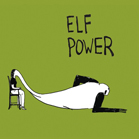 Athens, Georgia’s Elf Power is one of the few original Elephant Six bands remaining after the label’s demise in 2002. Most of the founding members have moved on to other projects and other labels. But Elf Power were never founding members of E6, though they were one of the bands at the center of the label’s hype in the late 90s. Listening to Elf Power, you would be hard pressed to identify it as an E6 release. Most of the label’s calling cards—lo-fi hiss, psychedelic instrumentation, Beatlesesque hooks—are missing from this album. In place, Elf Power plays with more straightforward production and a folk aesthetic that they have experimented with on other recent releases. Only here, these aesthetics take the spotlight. The choice to release their fourteenth (depending on what you count an official full-length) album with an eponymous title suggests that Elf Power are well aware of this reimagining of their sound. Dedicated to their late friend and contributor, Vic Chesnutt, the mood on this album is obviously dark, though the melodies and instrumentation are often bright and catchy. Still, this is an emotionally heavy album. While a far cry from the brilliance of their earliest releases, Elf Power is the strongest work the band has released since 2002’s Nothing’s Going to Happen.
Athens, Georgia’s Elf Power is one of the few original Elephant Six bands remaining after the label’s demise in 2002. Most of the founding members have moved on to other projects and other labels. But Elf Power were never founding members of E6, though they were one of the bands at the center of the label’s hype in the late 90s. Listening to Elf Power, you would be hard pressed to identify it as an E6 release. Most of the label’s calling cards—lo-fi hiss, psychedelic instrumentation, Beatlesesque hooks—are missing from this album. In place, Elf Power plays with more straightforward production and a folk aesthetic that they have experimented with on other recent releases. Only here, these aesthetics take the spotlight. The choice to release their fourteenth (depending on what you count an official full-length) album with an eponymous title suggests that Elf Power are well aware of this reimagining of their sound. Dedicated to their late friend and contributor, Vic Chesnutt, the mood on this album is obviously dark, though the melodies and instrumentation are often bright and catchy. Still, this is an emotionally heavy album. While a far cry from the brilliance of their earliest releases, Elf Power is the strongest work the band has released since 2002’s Nothing’s Going to Happen.
of Montreal
False Priest
 Remember when Hissing Fauna, Are You the Destroyer came out in 2007 and you thought, “Where did these guys come from?” You had never heard anything quite like it. You didn’t know what to call it, but you loved it. You shared it with all your friends with good taste in music. Most of them had already heard it and wondered what took you so long. You even shared it with some friends who have questionable taste, but they just looked at you weird. That’s OK, their loss. You went through of Montreal’s back catalogue, acquired older releases like Satanic Panic in the Attic, and they were really good. No Hissing Fauna, but still good. But then Skeletal Lamping came out, and you were all like, “What the WTF?” You listened to it exactly twice, maybe three times, and then you put it away, left it on your hard drive to return to one day, but you never did. Sure, it was fun. But was it good? No. You thought about giving up on them, but you decide to give False Priest a chance. You expect to be disappointed. But you enjoy the energy on “I Feel Ya Strutter,” and you are amused by the speaking parts on “Our Riotous Defects.” And then Janelle Monae starts singing. Damn, she has a nice voice. By the time “Coquet Coquette” comes on, you’re dancing in your chair. You’re glad your roommate isn’t home. Despite your expectations, you like it. It’s no Hissing Fauna, but it’s good. You keep listening. It’s a little long and several of the tracks don’t grab you, but it’s both fun and dark. You’ll listen again.
Remember when Hissing Fauna, Are You the Destroyer came out in 2007 and you thought, “Where did these guys come from?” You had never heard anything quite like it. You didn’t know what to call it, but you loved it. You shared it with all your friends with good taste in music. Most of them had already heard it and wondered what took you so long. You even shared it with some friends who have questionable taste, but they just looked at you weird. That’s OK, their loss. You went through of Montreal’s back catalogue, acquired older releases like Satanic Panic in the Attic, and they were really good. No Hissing Fauna, but still good. But then Skeletal Lamping came out, and you were all like, “What the WTF?” You listened to it exactly twice, maybe three times, and then you put it away, left it on your hard drive to return to one day, but you never did. Sure, it was fun. But was it good? No. You thought about giving up on them, but you decide to give False Priest a chance. You expect to be disappointed. But you enjoy the energy on “I Feel Ya Strutter,” and you are amused by the speaking parts on “Our Riotous Defects.” And then Janelle Monae starts singing. Damn, she has a nice voice. By the time “Coquet Coquette” comes on, you’re dancing in your chair. You’re glad your roommate isn’t home. Despite your expectations, you like it. It’s no Hissing Fauna, but it’s good. You keep listening. It’s a little long and several of the tracks don’t grab you, but it’s both fun and dark. You’ll listen again.
Sufjan Stevens
All Delighted People
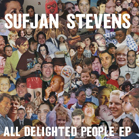 Traditionally, EPs are shorter than full-length albums, aka LPs. In UK charts, EPs are officially releases of under twenty-five minutes. Apparently, Sufjan Stevens never got this memo. Instead his All Delighted People EP is every bit as long as an LP—eight tracks clocking in at almost an hour. But what does Sufjan care for silly classifications? In the larger context, EPs are often works in an artist’s canon that appear between the major releases, and that’s exactly how this record qualifies as an EP. It’s a full release of solid material, but it will never have a place in Sufjan’s oeuvre on the same level as Seven Swans, Michigan, or Illinois. All Delighted People is a difficult record to get into. It lacks the immediacy and charm of Illinois, while retaining the complex arrangements and intricate structures of Sufjan’s most challenging work. Bookended by two tracks over ten minutes long, both of which develop slowly, casual fans may not give this record much of a chance. But the songs are beautiful and Stevens shows the same obsessive attention to detail as he always has. The EP rewards repeat listening and gives us a nice glimpse of what we have to look forward to from The Age of Adz, which drops October 12.
Traditionally, EPs are shorter than full-length albums, aka LPs. In UK charts, EPs are officially releases of under twenty-five minutes. Apparently, Sufjan Stevens never got this memo. Instead his All Delighted People EP is every bit as long as an LP—eight tracks clocking in at almost an hour. But what does Sufjan care for silly classifications? In the larger context, EPs are often works in an artist’s canon that appear between the major releases, and that’s exactly how this record qualifies as an EP. It’s a full release of solid material, but it will never have a place in Sufjan’s oeuvre on the same level as Seven Swans, Michigan, or Illinois. All Delighted People is a difficult record to get into. It lacks the immediacy and charm of Illinois, while retaining the complex arrangements and intricate structures of Sufjan’s most challenging work. Bookended by two tracks over ten minutes long, both of which develop slowly, casual fans may not give this record much of a chance. But the songs are beautiful and Stevens shows the same obsessive attention to detail as he always has. The EP rewards repeat listening and gives us a nice glimpse of what we have to look forward to from The Age of Adz, which drops October 12.
The Walkmen
Lisbon
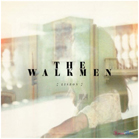 The sixth full-length from the NYC troubadours finds them embracing a slightly more polished sound than they employed on earlier garage rock inspired releases. The Walkmen recorded the eleven songs featured on Lisbon in five days, but you would never be able to tell from the tight arrangements and melodic pop showcased in many of the tracks here. The first single, “Stranded,” demonstrates their pop disposition with horn melodies and a swelling chorus, though “Woe is Me” proves to be the catchier number. Most of the songs relax into a slow place, with lush and spacious instrumentation. The final three tracks—“Torch Song,” “While I Shovel the Snow,” and “Lisbon”—afford Hamilton Leithauser the chance to play crooner, with his slightly echoed vocals taking center stage above the downtempo instrumentation. At the most upbeat moments, “Angela Surf City” and “Victory” are the closest they come to a true rocker, though even these songs are miles away from 2004’s “The Rat.” Despite Lisbon’s departure from the raw production of earlier Walkmen LPs, fans of the group should find plenty here to love, as should fans of The National and Grizzly Bear.
The sixth full-length from the NYC troubadours finds them embracing a slightly more polished sound than they employed on earlier garage rock inspired releases. The Walkmen recorded the eleven songs featured on Lisbon in five days, but you would never be able to tell from the tight arrangements and melodic pop showcased in many of the tracks here. The first single, “Stranded,” demonstrates their pop disposition with horn melodies and a swelling chorus, though “Woe is Me” proves to be the catchier number. Most of the songs relax into a slow place, with lush and spacious instrumentation. The final three tracks—“Torch Song,” “While I Shovel the Snow,” and “Lisbon”—afford Hamilton Leithauser the chance to play crooner, with his slightly echoed vocals taking center stage above the downtempo instrumentation. At the most upbeat moments, “Angela Surf City” and “Victory” are the closest they come to a true rocker, though even these songs are miles away from 2004’s “The Rat.” Despite Lisbon’s departure from the raw production of earlier Walkmen LPs, fans of the group should find plenty here to love, as should fans of The National and Grizzly Bear.
